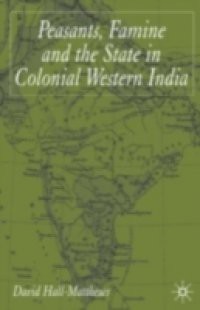Recent literature has suggested that famines are complex, long-drawn-out and political processes, rather than sudden, natural phenomena. This book is among the first to examine such a process in detail, by studying poor peasants in Ahmednagar district, Western India, between 1870 and 1884. It does so by investigating their factors of production - land, capital and labour - as well as markets in credit and the cheap foodgrains they produced and, above all, their relationship with the colonial state.It is argued that by taxing too heavily, investing too little and forcing peasants to trade in poorly-developed markets, the state exacerbated peasants' vulnerability to climatic and economic shocks and contributed to their gradual slide into famine. Though peasants' difficulties were recognised at local levels, the hierarchical structure and ideological certainty of an early developmental state made it ill-equipped to respond to the needs of remote poor peasants.

